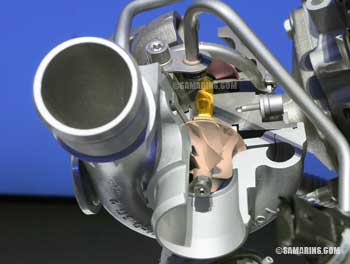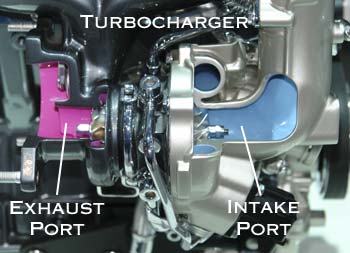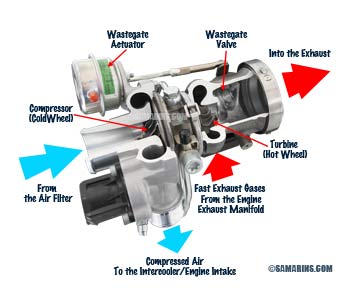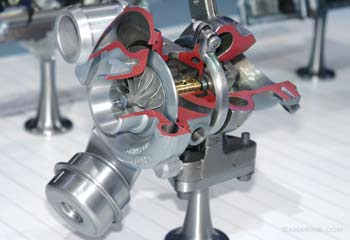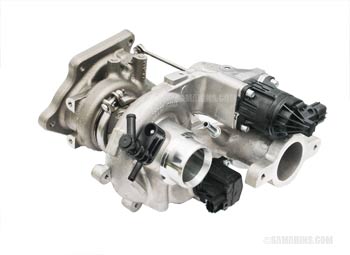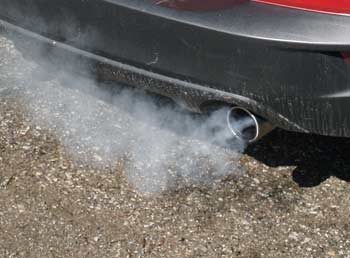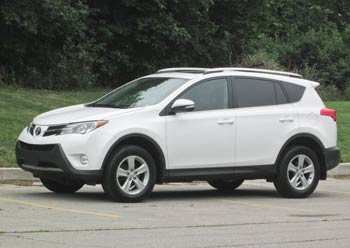Pros and Cons of Turbo engines
Updated: October 23, 2022
With stricter fuel economy standards, more and more cars come with turbocharged engines. With a turbocharger, the vehicle can have a smaller engine and use less fuel when coasting or in stop-and-go traffic. When needed, the turbocharger kicks in and provides extra power. What are the pros and cons of turbo engines? Do turbocharged engines require more maintenance? What should you watch out for when buying a used car with a turbo engine? Let's start with pros and cons:
Pros:
1. The turbocharger allows for a smaller fuel-efficient engine while providing extra power when needed.
2. Exhaust gases are not wasted, but used to add more engine power.
3. Many turbocharged cars and trucks are fast and fun to drive.
4. The turbocharger adds more torque at lower RPMs.
5. Cars with a lighter 4-cylinder turbo engine have a better weight distribution compared to the same cars with a heavy V6 or V8. Better weight distribution means more balanced handling.
6. Due to forced induction, turbocharged engines are better at higher altitudes when driving in the mountains.
Cons:
1. The turbocharger adds complexity to the engine, which means higher risk for potential problems as the car ages.
2. Turbocharged cars are more sensitive to poor maintenance and require more expensive premium synthetic oil and some require premium gasoline.
3. Due to the extra pressure and complexity of the crankcase ventilation or PCV system, turbocharged engines are more likely to develop oil leaks or consume oil at higher mileage.
4. Turbocharged engines are easier to overheat. For example, blown head gaskets are more common in turbocharged engines.
5. Replacing a turbocharger if it fails is costly.
6. Turbo lag on acceleration.
What does a turbocharger do in a car? The turbocharger is a power-boosting device attached to the vehicle's exhaust manifold. The turbocharger has two separate ports, exhaust and intake. The turbocharger shaft has small turbines installed on both ends of the shaft.
One turbine or hot wheel is in the exhaust port, another turbine called compressor or cold wheel is in the intake port. Hot exhaust gases rapidly exiting the engine spin the hot wheel turbine inside the exhaust port. The shaft transfers the rotation to the compressor (intake turbine or cold wheel). The turbocharger shaft spins at very high speeds. The compressor forces air under pressure into the engine intake (forced induction).
In many cars, the compressed air from the turbocharger first passes through an intercooler to cool it down and increase its density and then enters the engine intake.
With more air entering the engine, the car computer adds more fuel, boosting the engine power.
At higher mileage, as the cylinder walls and pistons rings wear out, higher combustion chamber pressure results in increased pressure inside the engine crankcase. This often causes turbo engines to have oil leaks that are difficult to fix.
That said, there are many turbo engines that are known to last long. Take, for example, the turbodiesel in some Volkswagen cars. We have seen many of them going well past 200K miles with good maintenance. Some other German turbo cars are also known to last with good care.
To summarize, turbo-charged engines are not 'unreliable' but due to more complex design, the risk for potential problems at higher mileage is greater compared to similar non-turbo engines.
Do turbo engines require more maintenance? The short answer is yes, and there are two reasons for that:
- The first reason is that adding a turbocharger to a smaller engine makes it work harder. The turbocharger increases the pressure and temperature inside the combustion chambers of the engine, which adds more strain on internal components including pistons, valves, and the head gasket. The harder the engine works, the faster it wears out.
- The second reason is inherent in the design of a turbocharger: it has to work at extreme temperatures of hot exhaust gases, while the turbocharger shaft is lubricated by engine oil. This means there is more demand for oil quality as it deteriorates faster under extreme heat. Most turbocharged cars require high-quality synthetic oil and have shorter maintenance intervals. Some require premium gasoline.
What to watch out for when buying a used car with a turbo engine? Check reliability ratings of the car you want to buy; some turbo cars are more reliable than others. Does the vehicle require premium gasoline? Are there any service records confirming that the oil changes have been done regularly?
Turbocharged engines tend to have specific problems. When test-driving a used car with a turbo engine, watch out for white smoke from the exhaust (see photo) with a smell of burnt oil. It could be just a small puff when the engine is started, but it means it's better to avoid the car, as the turbocharger is worn out.
Some turbocharged engines are known to consume oil. Watch out for the low oil level, which might indicate higher oil consumption.
Watch out for screeching or whining noises from the turbocharger at certain boost stages; it's a sign of a failing turbocharger.
Advertisement
Watch out for oil leaks. The first symptom of oil leaks is a burnt oil smell coming from under the hood. Have the vehicle inspected by your mechanic before buying. An experienced mechanic can not only lift the vehicle and check for oil leaks underneath, but advise you about common problems the vehicle may have in the future.
Ask your mechanic to visually check the condition of the inside engine components if possible. Black deposits covering the oil dipstick or lodged under the oil filler cup inside the engine indicate poor maintenance. It's best to avoid a vehicle with a turbo engine that shows signs of lack of maintenance.
